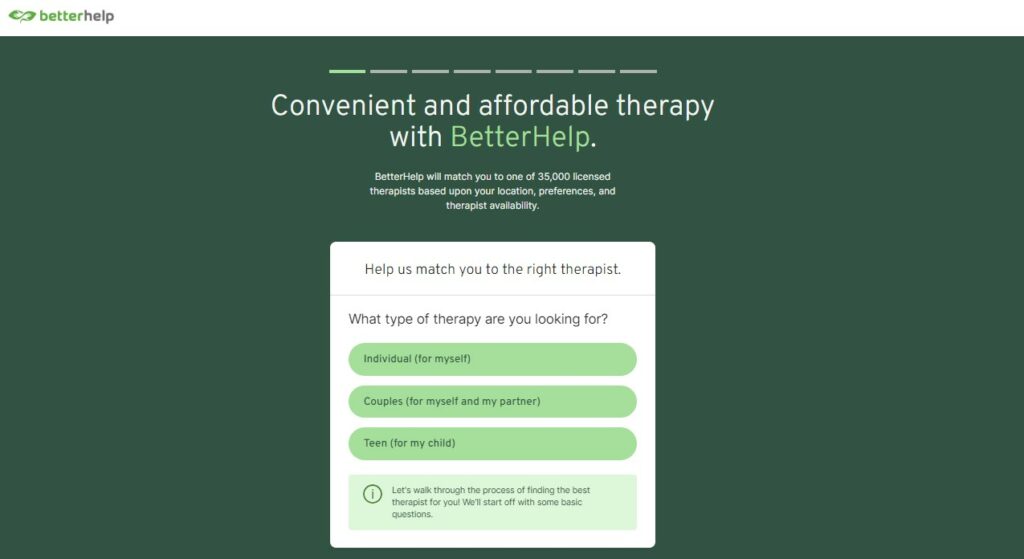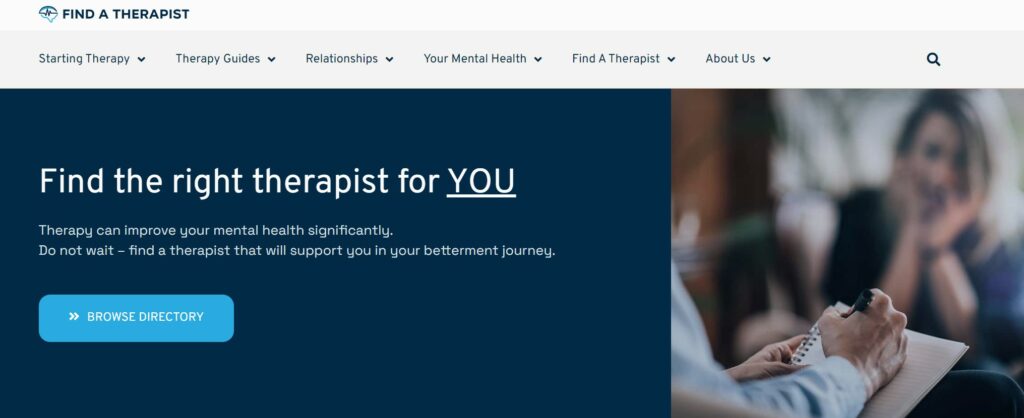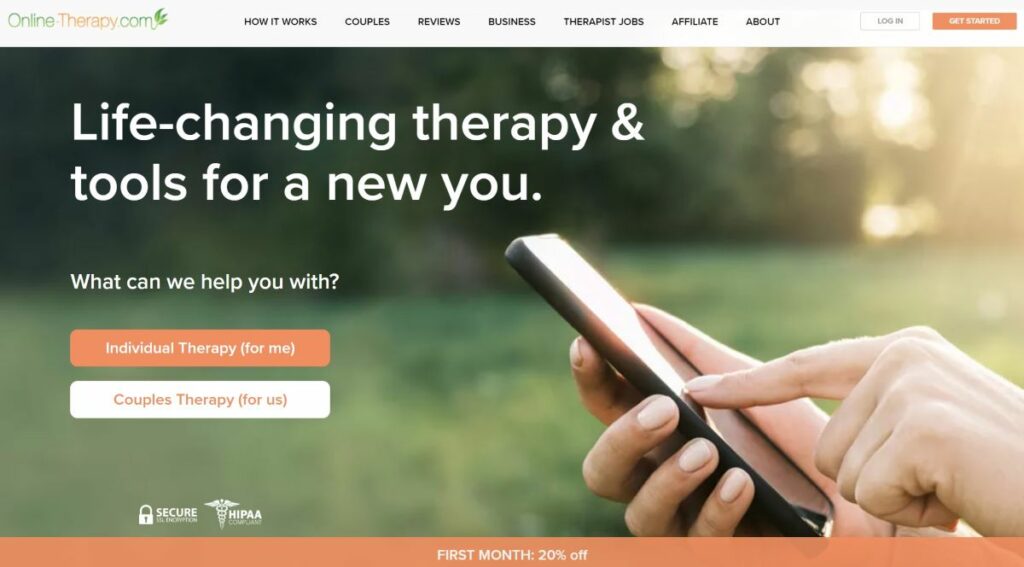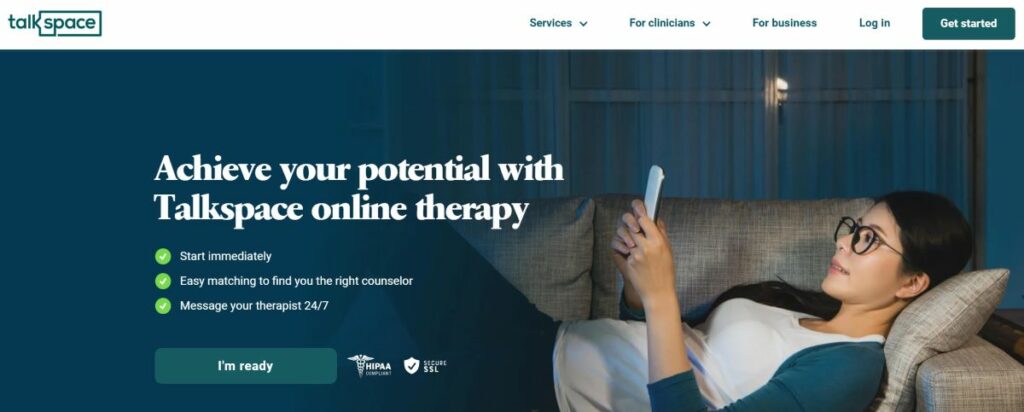Obsessive compulsive disorder (OCD) can be very difficult to manage. When your thoughts are stressing you out to a level that you are using repetitive behaviors to manage this, it might be time to seek help.
In this guide, we’ve looked at the best places to find an online therapist for help with OCD, considering some people could be more comfortable attending therapy sessions from their own homes. We’ll also look at this disorder in more detail, and how to treat it.
Want to skip right to the suggestions for OCD therapists? Here are our 5 recommended therapy solutions:
OCD therapists near me
Let’s begin our reviews. Below, you will find five platforms that can connect you with a therapist to help manage your OCD.
| Povider | Good For | Location | Pricing |
|---|---|---|---|
| BetterHelp | Quick match with the right therapist four you | Online therapy | $65 to $90 per week (billed every 4 weeks) |
| Find-a-therapist.com | Finding and contacting the right therapist for you | Online and in-person therapy | Varies depending on the counselor fee |
| Calmerry | Depression therapy, online grief counseling, anxiety therapy, therapy for OCD, self-esteem therapy | Online therapy | $49.50 to $73.75 per week (billed monthly) |
| Online-therapy.com | Finding licensed and experienced therapists with a Cognitive Behavioral Therapy (CBT) approach | Online therapy | $40/week to $88/week (including our 20% discount first month) |
| TalkSpace | Depression, anxiety, bipolar disorder, OCD, PTSD, LGBTQIA+ therapy | Online therapy | Varies according to insurance coverage or self-pay options |
1. BetterHelp

Explore emotional well-being with BetterHelp – your partner in affordable online therapy. With 30,000+ licensed therapists and plans starting from only $65 per week, BetterHelp makes self-care accessible to all. Complete the questionnaire to match with the right therapist.
- Good for: Quick match with the right therapist four you.
- Location: Online therapy.
- Pricing: $65 to $90 per week (billed every 4 weeks).
- Features: iOS and Android app available, message your therapist anytime, live sessions are scheduled weekly and done via live chat, phone, or video call.
BetterHelp is an online therapy platform, with plenty of licensed therapists available who are experienced at providing online treatment for OCD. When you join BetterHelp, their mental health professionals provide therapy through video/phone calls, text messages, and live chat.
Read our BetterHelp review here.
2. Find-a-therapist.com

- Good for: Finding and contacting the right therapist for you.
- Location: Online and in-person therapy.
- Pricing: Varies depending on the counselor fee.
- Features: Filter your search, find accessible and effective online and in-person therapy, find guides on different types of therapy.
Find-a-therapist.com allows individuals to easily search for and connect with qualified mental health professionals. This website provides detailed profiles of therapists like May Izadi, Lincoln Stoller, or Matthew Crane who have experience in addressing OCD.
3. Calmerry

Embark on a journey of mental wellness with Calmerry. With diverse subscription options, starting at just $50, Calmerry makes prioritizing your mental health simple and accessible. You can message your therapist any day or schedule a live therapy session from the comfort of your home from any device.
- Good for: Depression therapy, online grief counseling, anxiety therapy, therapy for OCD, self-esteem therapy.
- Location: Online therapy.
- Pricing: $49.50 to $73.75 per week (billed monthly).
- Features: Message to your counselor anytime, text therapy and video therapy according to the plan you choose, free counselor switching.
Calmerry is a subscription-based e-counseling platform focusing on talk therapy. All therapists and counselors on this platform are licensed professionals with experience in different areas of mental health, including OCD.
Read our comparison between Calmerry and BetterHelp here.
4. Online-therapy.com

Discover transformative online therapy with Online-therapy.com. Through cognitive behavioral therapy (CBT), Online-therapy.com offers individual and couples support starting at $45/week. Engage in sessions via video, voice, or text for maximum flexibility. Fill out their online questionnaire to get started.
- Good for: Finding licensed and experienced therapists with a Cognitive Behavioral Therapy (CBT) approach.
- Location: Online therapy.
- Pricing: $40/week to $88/week (including our 20% discount first month).
- Features: Unlimited messaging with your therapist, including a daily journal and activity plan, yoga and meditation videos, and tests to see your progress.
Online-therapy.com offers therapy sessions and plans focused on cognitive behavioral therapy (CBT), which is a recommended treatment for OCD. Additionally, this platform includes online resources like videos, audio clips, and written guides to help you overcome your OCD.
Read our online-therapy.com review here.
5. TalkSpace

Tailored to individuals, couples, teens, and offering psychiatry services, Talkspace plans kick off at a wallet-friendly $69 per week. What’s more, many health insurances also cover their services, enhancing accessibility and affordability. Complete a questionnaire and get matched with the right therapist for you.
- Good for: Depression, anxiety, bipolar disorder, OCD, PTSD, LGBTQIA+ therapy.
- Location: Online therapy.
- Pricing: Varies according to insurance coverage or self-pay options.
- Features: Accepts insurance, pick your therapist from a list of recommendations, live video sessions and unlimited messaging with your therapist, medication management.
TalkSpace is an online therapy platform that provides mental health services. The platform connects individuals with licensed therapists and psychiatrists, offering a range of therapy options through digital communication. Professionals in TalkSpace address a variety of mental health needs, including OCD.
Read our TalkSpace review here.
What is Obsessive-compulsive Disorder (OCD)?

Obsessive-compulsive disorder (OCD) is a neuropsychiatric disorder recognized by the American Psychological Association. It is characterized by recurrent distressing thoughts and repetitive behaviors or mental rituals.
Usually, people perform these compulsive actions to help reduce anxiety. It often years between when OCD symptoms arise to when people are diagnosed with OCD, possibly because many people cover these symptoms with shame and secrecy.
Since 2013, obsessive compulsive disorder has been categorized as a specific disorder in its own right – previously, it was classed as one of the anxiety disorders.
What isn’t OCD?
OCD is not just being clean or wanting to keep your house neat and tidy. Obsessive compulsive disorder is a time consuming issue – the acts interfere with your daily activities. The symptoms of OCD cause a clinically significant impact on your social, occupational and other areas of your life.
If you have OCD, you are spending at least an hour per day on these obsessions and compulsions. In short, OCD is a combination between obsessive thoughts or urges with repetitive behaviors that are rather excessive or wouldn’t factually solve the anxiety or distress the patient is feeling.
Signs and Symptoms of OCD

People with OCD present with obsessions, compulsions, or both.
There are two symptoms of obsessions:
- Thoughts, images, or urges that are recurrent and persistent. Usually, people find these disturbing, intrusive or unwanted, and in most cases, they cause marked anxiety or distress.
- You try to ignore, neutralize or suppress the above symptom with thought or action (by presenting a compulsion).
There are two necessary symptoms of compulsions:
- Repetitive behaviors or mental acts that you need to do as a reaction to an obsession, or a rigid rule.
- You perform these acts or behaviors as a way to prevent or reduce distress or a dreaded event or situation. The connection between these acts and the events or distress are not realistically connected, or are excessive.
What Causes OCD?
OCD is caused by an interplay between your neurobiology, genetics, and environment. For example, it might be that your genetics make you vulnerable in how you manage environmental stressors.
The Obsessive Compulsive Cognitions Working Group found some dysfunctional beliefs that could underlie OCD symptoms. The three following beliefs are common:
- Overestimation of threat or an inflated sense of responsibility
- Beliefs about the importance of, and need to control, intrusive thoughts
- Perfectionism and intolerance of uncertainty
Can OCD be Treated Online?
OCD can be treated effectively over the internet. Online therapy can be a viable option for those that don’t have easy access to face-to-face therapy, or who feel anxious about seeing a therapist in person.
Studies show that online therapist-assisted CBT may be just as effective as traditional therapy. Further, your working alliance with a therapist doesn’t differ for patients receiving therapy online or face-to-face, provided that the therapist is experienced in providing support over the internet (they know how to overcome any technical obstacles, for example).
Although they cannot read your body language as easily, as long as you’re able to communicate effectively with your therapist, you can get help for your OCD over the internet.
Pros and Cons of Online OCD Therapy

Online therapy for Obsessive-Compulsive Disorder (OCD) has its advantages and disadvantages, like any form of mental health treatment.
| Pros | Cons |
|---|---|
| Online OCD therapy provides accessibility to individuals who may have difficulty accessing in-person therapy due to location, mobility, or other constraints. | Some clients may prefer traditional face-to-face therapy for the personal connection it offers, which can be challenging to replicate in an online setting. |
| Clients can attend therapy sessions from the comfort of their own homes, reducing the stress associated with travel and making it more convenient for those with busy schedules. | If you or your therapist has problems with their WiFi or internet connection, this could disturb your sessions. |
| Online therapy may be more cost-effective for some individuals, eliminating transportation costs and potentially offering lower session fees. | Only certain health insurance providers cover online therapy, and the ones that do only cover certain providers. |
| Online platforms often offer a diverse selection of therapists, allowing clients to find a professional with expertise in OCD treatment. | In severe cases of OCD or other mental health conditions, in-person therapy or a higher level of care may be more appropriate. |
Which is the Best Type of OCD Treatment?
OCD can be treated using different psychological therapy and/or psychopharmacology methods.
- Cognitive behavioral therapy (CBT): is a form of therapy in which therapists work to adapt faulty or unhelpful ways of thinking (or behaviors) that are part of the psychological problem.
- Exposure therapy: is a way of “exposing” you to what is difficult. An example is exposing someone with a phobia of spiders to spiders, step by step, and working through how you respond in these stressful situations.
- Medication: serotonergic medications can help people suffering from extreme OCD. Such medications include tricyclic antidepressants and selective serotonin reuptake inhibitors.
Medication is not always necessary to treat OCD, especially if your symptoms are not extreme. However, it can be helpful in dealing with very serious cases of OCD, when combined with psychological therapy. Your therapist will be able to advise on whether or not to consider seeing a psychiatrist for OCD medication.
Can You Get Over OCD Without Treatment?

It is not easy to overcome OCD without treatment. While you might be able to live with it, chances are that it won’t go away on its own.
If your daily life is interrupted by these thoughts or compulsions, then you should contact a therapist to learn some tools to manage these symptoms. Even seeing a therapist for a short period to learn some strategies to manage your OCD can be extremely helpful.
If you have any questions, or would like more help choosing a therapist for OCD, feel free to contact us.





